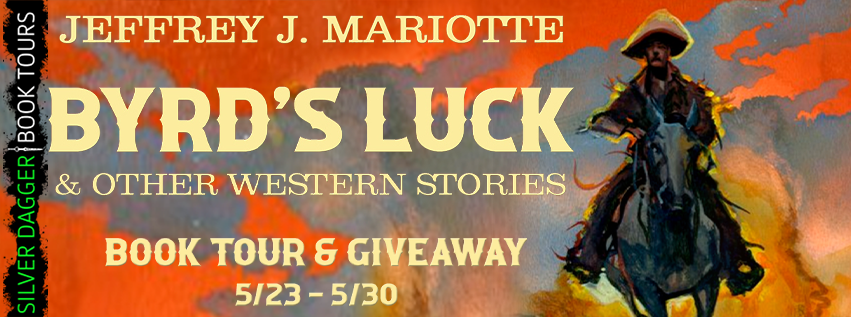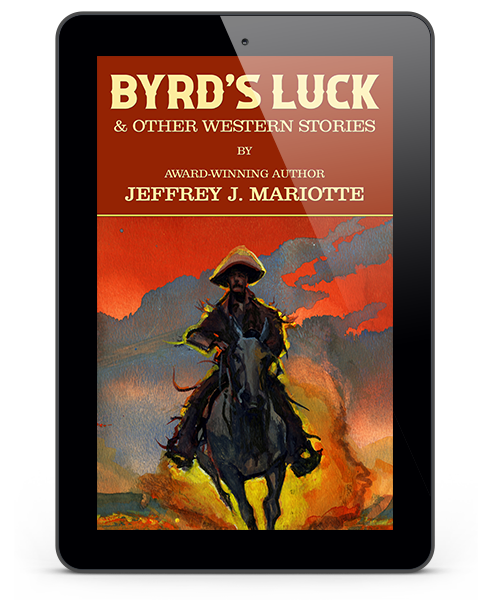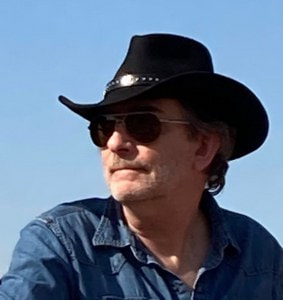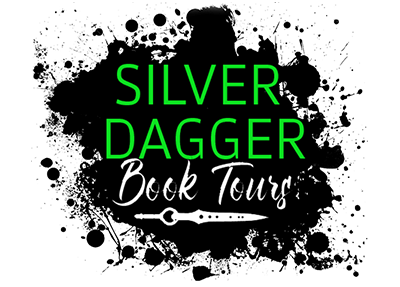Byrd's Luck & Other Western Stories : Traditional Western and Western Horror Fiction by Jeffrey J. Mariotte ➱ Book Sale with Guest Post & Rafflecopter
Byrd's Luck & Other Western Stories
by Jeffrey J. Mariotte
Genre: Traditional Western and Western Horror Fiction
The
crack of a rifle, the thunder of hooves, the silence of the desert at
dawn . . . Mariotte takes you there
Western
stories by Jeffrey J. Mariotte have appeared in collections alongside
those of legendary Western writers like Louis L’Amour, William
Johnstone, Elmer Kelton, and Loren Estleman. Now, BYRD’S LUCK &
OTHER WESTERN STORIES collects ten of his own riveting tales of the
wild West.
Brand-new stories include “Byrd’s Law”—a
sequel to the Spur Award and Peacemaker Award finalist “Byrd’s
Luck,” costarring Cody Cavanaugh—the hero of his own
action-packed novel trilogy—and the first-ever prose story
featuring characters from Mariotte’s bestselling, award-winning
horror-Western comics series Desperadoes.
A mix of traditional and weird Western tales, this book has something
for every fan of Western adventure.
Click
the Buy Now button and be immediately transported back to the Wild
West!
Praise
for Jeffrey J. Mariotte
“Jeffrey
J. Mariotte . . . can tell a good story in any genre.” – Johnny
D. Boggs
One of the best storytellers in the business." –
Brian Keene
"Jeff is a very creative guy." – Clive
Barker
"This taut, superbly-written elegy also has a
cinematic quality, and I thought of a Sam Peckinpah-directed
end-of-the-west movie with a script by Elmore Leonard.” – Andrew
McBride, on "The Fox and the Snake" (included in Byrd's
Luck & Other Western Stories).
“Mariotte
can flat-out write.” – Don Winslow (on River
Runs Red)
"...several
jaw-dropping plot twists and one of the best action sequences I’ve
read in a long time.” – David Morrell (on River
Runs Red)
"Mariotte's
one hell of a writer." – Christopher Golden (on River
Runs Red)
"I
was pulled in from the start on this one and it never let up. I
highly recommend it.” – Michael Connelly (on Empty
Rooms)
"Keenly
observed and deftly written, it’s something you’ll want on your
shelf as long as you have one." – T. Jefferson Parker
(on Empty
Rooms)
** Only .99cents!! **
What are your top 10 favorite books/authors?
What book do you think everyone should read?
Every American should read To Kill a Mockingbird, which not only tells how Americans lived in small towns in the 1930s, before the post-WWII growth of suburbs. It’s not only a brilliant depiction of a vanishing or vanished way of life, it’s also about the horrors of sexual assault and racism, but it’s told in such a warm and humorous way that you learn to love the main characters and appreciate what they go through. There’s no better American novel, I believe.
How long have you been writing?
I’ve been writing professionally since 1988, when my first short story was published. But really, I’ve been writing since early childhood. I was always making up and writing down dumb little stories. In fifth grade some friends and I started creating little comics, just pencil or pen on paper stapled together, until our teacher spotted us and took them away.
What kind of research do you do before you begin writing a book?
I like to do enough research to get a broad picture of who the characters will be and where they are. If possible, I like to go to the places in the book. It’s easy to do online research about places, but that’s not the same as standing in the same spot they’ll be, seeing and hearing and smelling what they’ll see and hear and smell. If there’s a specialty occupation, like a police officer or arson investigator or astronaut or cowboy, I like to learn what that job is like, what the preparation for it would be, what the biggest drawbacks are, and what it takes to succeed at it. Once I have the characters and their world pretty firmly set in my mind, I can get started, and if I need some specific information along the way, I can look that up.
Do you see writing as a career?
Writing is a career for me, but it’s not my sole occupation. For three years after I graduated from college, I worked at a shopping center doing maintenance—electrical work, plumbing, roofing, janitorial, etc. It was an education, but not what I wanted to do long-term. After those three years I went to work at a bookstore in the shopping center, and ever since—43 years and counting—I’ve made my living from stories and words and books. I’ve been a bookseller, bookstore manager, and bookstore owner. I’ve been a publishing executive, a senior editor at DC Comics, and the first editor-in-chief at IDW Publishing (where our oldest son now works as an editor). I’ve been a technical editor in the defense industry, and now I’m the managing editor for a company that makes educational materials for law students and lawyers.
And for most of that time, I’ve also been writing professionally. I’ve been lucky to be able to earn a good living in the area that I love best—using words to tell stories.
What do you think about the current publishing market?
The publishing market is tough these days. The biggest publishing companies keep buying each other out, reducing the number of opportunities available to writers. As giant multinational corporations, they answer to stockholders, who want profits. So instead of investing in a writer’s career, carrying him or her along until their books start making money, they want every book to be a bestseller, and if it’s not bestseller material they won’t take a chance on it. A lot of the best books ever written wouldn’t have been bestseller material at the time, but their popularity grew over the years and decades.
Technology has opened new avenues, making it easier for small and midsize publishers to function and for people to self-publish. But those arenas have drawbacks, too. The sheer number of books published every year makes it hard for any single book to be discovered and to have the opportunity to build an audience. Self-publishing removes the gatekeeper role that agents and acquisitions editors used to play, which makes it riskier for bookstores to take chances. That results in more and more books being sold online, where the reader doesn’t have a chance to pick it up and turn it around and look at it before buying. I still prefer to read print—I spend plenty of time looking at screens when I’m working or writing—and I like to hold a book in my hands before I buy it.
So there’s lots of opportunity, but it’s harder than ever to break out in a big way. Book sales are up most months, but there are also more books, so the dollars going to any specific book—beyond the huge bestsellers—are more diluted. It’s not an easy way to earn a living.
Do you read yourself and if so what is your favorite genre?
I read constantly. I read for pleasure, for information, and for research. The last thing I do before going to bed at night is to read at least a few pages of fiction, which helps settle my mind from the day’s activities. I love multiple genres (and as a result, I write in multiple genres, which has not necessarily been good for my career. Someone who likes my horror might not like my thrillers or my Westerns. Somebody who likes my Star Trek or Buffy or NCIS tie-in novels might not care about my original supernatural thrillers. Someone who likes my comics might never pick up my novels. All of which is beside the point.) I read all the things I write, and more—thrillers, mysteries, horror, Westerns, mainstream. I read books about the outdoors, nature, the human and natural history of the American West. I used to read more fantasy and science fiction than I do these days, but every now and then I’ll still pick up something in those genres.
Do you have any advice to offer for new authors?
Starting a book can be overwhelming because there are So. Many. Options. When I’m approaching a new project and I have a basic idea of the situation I want to write about, I picture a hallway with an infinite number of doors. They’re all open, and I’m walking down the hallway. Every decision I make about the project closes a number of them. If I know what genre the book will be—say it’s a thriller—then the doors for romance, science fiction, fantasy, horror, Western, etc., all close. Then I narrow it down. If it’s a contemporary thriller, then I close off historical and future. If it’ll be set in the United States, that closes Europe, Asia, South America, outer space, fantasy worlds. Step by step down the hallway, I close the doors I don’t need, until the remaining open ones tell me what my story will have to be.
What is your writing process? For instance do you do an outline first? Do you do the chapters first?
When writing a novel, I prefer to have an outline, and I do recommend that for beginning novelists as well. I have written books without an outline, but it’s a struggle. To me, an outline is a road map. It lets me know where I’m starting out, where I’m ending up, and the basic route along the way. If as I’m going along, I see a sign pointing toward the “World’s Largest Ball of String,” of course I’ll go out of my way to visit that. But I don’t get lost, because I still have the map.
Without an outline, I spend a lot of time getting lost, and write myself into a lot of dead ends. The outline makes the process more efficient and easier, without inhibiting my creativity (because after all, I created the outline and I can adjust it as I see fit).
How long on average does it take you to write a book?
I like to have four or five months available to write a book. I recently had contracts with a publisher who wanted a complete novel, 60-70,000 words, every three months. With a day job and family responsibilities, that was really hard to pull off, and I did it for 18 months straight. I won’t say it nearly killed me, but it burned me out for a long time. I’m back to work on a new book now, and I made sure to have at least four months, with the understanding that if I need longer I can get it.
Do you believe in writer’s block?
I’ve very rarely experienced it, which is probably why I’ve had so many books and stories and comics/graphic novels published. I believe writer’s block usually comes from having made a wrong turn somewhere earlier in the project. The writer had a character do something that character just wouldn’t do, based on the established characterization, so now that character is stuck, and the writer needs to go back and figure out what went wrong before the story will start to flow correctly again. I’ve known blocked writers, and it’s always been that kind of situation—once they find where they went wrong, they can fix it and start going right again. Being a professional writer with deadlines seems to be a pretty good cure for writer’s block, because if the editor expects the manuscript on a certain date, you’d better deliver it—especially if you want to work with that editor again. Editors have no shortage of writers who want to sell them books, so if you value the relationship with that editor and publisher, you want to be easy to work with, not difficult.
Jeffrey J. Mariotte has written more than sixty books, including the police-procedural mystery series Major Crimes Squad: Phoenix, historical Western epic Blood and Gold: The Legend of Joaquin Murrieta (with Peter Murrieta), the Cody Cavanaugh traditional Western series, supernatural thrillers River Runs Red, Missing White Girl, and Cold Black Hearts, horror epic The Slab, and the teen horror quartet Year of the Wicked. Other works include the acclaimed thrillers Empty Rooms and The Devil’s Bait, and—with his wife and writing partner Marsheila (Marcy) Rockwell—the science fiction thriller 7 SYKOS and Mafia III: Plain of Jars, the authorized prequel to the hit video game, as well as shorter works. He has also written novels set in the worlds of Tarzan, Deadlands, Star Trek, CSI, NCIS, Narcos, 30 Days of Night, Spider-Man, Conan, Buffy the Vampire Slayer and Angel, and more. He is also the author of many comic books and graphic novels, including the original Western series Desperadoes, the horror series Fade to Black, action-adventure series Garrison, and the original graphic novel Zombie Cop.
Three of his novels have won Scribe Awards for Best Original Novel, presented by the International Association of Media Tie-In Writers. He’s also won the Inkpot Award from the San Diego Comic-Con, is a co-winner of the Raven Award from the Mystery Writers of America, and has been a finalist for the Spur Award from the Western Writers of America, the Peacemaker Award from the Western Fictioneers, the Bram Stoker Award from the Horror Writers Association, the International Horror Guild Award, and for his comics writing, the Harvey Award and the Glyph Award.
He has worked in virtually every aspect of the book business, as a bookstore manager and owner, VP of Marketing for Image Comics/WildStorm, Senior Editor for DC Comics/WildStorm, and Editor-in-Chief for IDW Publishing and a publishing consultant for various companies. When he’s not writing, reading, or editing something, he’s probably out enjoying the desert landscape around the Arizona home he shares with his family and dog and cats. Find him online at www.jeffmariotte.com, www.facebook.com/JeffreyJMariotte, and @JeffMariotte.
Website * Facebook * Twitter * Instagram * Bookbub * Amazon * Goodreads
Follow the tour HERE for special content and a giveaway!
$10 Amazon










Thank you for doing this!
ReplyDeleteThis sounds like a good book.
ReplyDelete